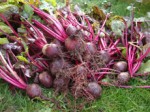The soil here is mostly heavy clay. It needs hard physical labour and organic matter to keep in good condition. Even so, members are expected to cultivate (ie dig over and keep free of weeds) at least 2/3rds of plots for the production of fruit and vegetables. The remaining third of plots can perhaps be planted with flowers or wildlife-friendly plants. This is also where a toolbox and maybe a bench can be placed.
We share this land with foxes, crows, kestrels, magpies, pigeons, jays, woodpeckers, squirrels, frogs, newts, bees and many, many slugs, most of whom will happily ‘share’ crops to the point of taking it all. Inorganic gardeners are expected to keep their use of chemicals within reasonable limits and strictly confined their plot – no spraying next door’s organic plot in a high wind! But by the same token, organic gardeners may not justify having a large area of seeding perennial weeds on their plots by claiming that they are ‘wildlife friendly.’ Ponds, to encourage slug-eating frogs, are allowed as long as they are small enough not to pose a hazard and show visible benefit to wildlife.
Aluminium sulphate slug pellets are preferred to blue metaldehyde, which eventually kills thrushes, hedgehogs and other slug predators. Planting of bee and butterfly-friendly plants and flowers, in small patches, is encouraged. All organic waste is to be composed on plots and domestic kitchen waste may be brought for composting here too. Compost improves soil and make it easier to manage and more productive.
 Observe the annual cycle. “Nature will not wait.” The most successful allotmenteers are those who understand the need for regular attendance and pay close attention to soil condition, the weather and natural processes. We do not ‘grow’ fruit and vegetables, they do that themselves. What we do is attempt to provide the best possible growing conditions for the plants through the seasons. This takes knowledge and skills that are developed through the practice and experience of tending a plot and getting to know it as it changes through the year.
Observe the annual cycle. “Nature will not wait.” The most successful allotmenteers are those who understand the need for regular attendance and pay close attention to soil condition, the weather and natural processes. We do not ‘grow’ fruit and vegetables, they do that themselves. What we do is attempt to provide the best possible growing conditions for the plants through the seasons. This takes knowledge and skills that are developed through the practice and experience of tending a plot and getting to know it as it changes through the year.
In winter the ground can be waterlogged, in summer it can be baked and cracked. But for a few weeks in autumn or spring the soil is easy to work. If plots are not tended for a month or more they can go from well-kept to overgrown with surprising rapidity. Neglect of a plot will soon attract attention so if you wish to keep it be sure to inform the chairman of any periods when unable to look after your plot, whatever the reason.
Keeping an allotment is most successful if it is given regular attention as part of a weekly routine. It will require a lot of work in spring/early summer, more again in autumn and less in winter. Get it right and you’ll be amazed at how much produce, and satisfaction, can be derived from a small piece of hill.
